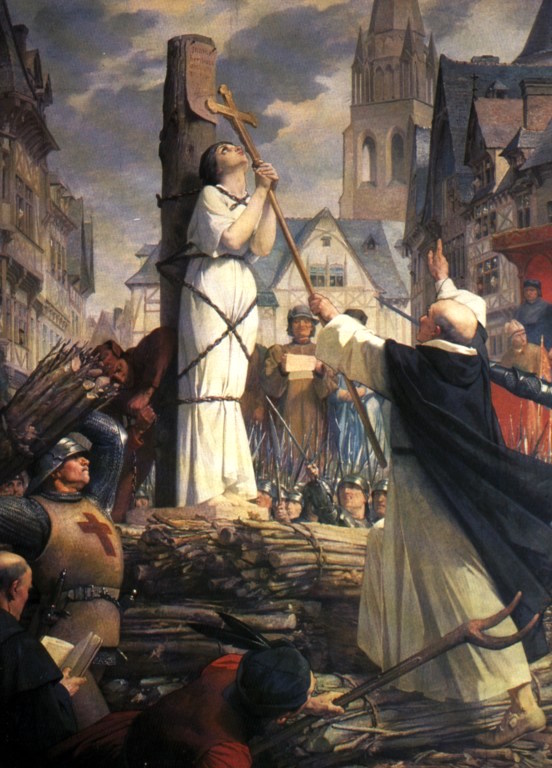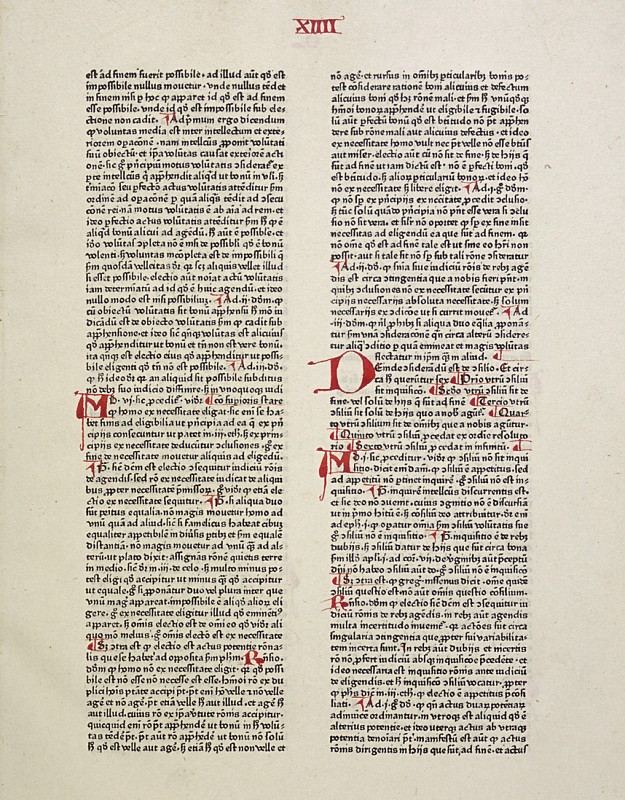|
Henry Of Gorkum
Henry of Gorkum (c. 1378 – February 19, 1431) was a Dutch theologian known for his commentaries on St. Thomas Aquinas and his defense of Thomism.Janz, Denis (1983). ''Luther and late medieval Thomism: a study in theological anthropology.'' Wilfrid Laurier Univ. Press, Life and career Henry was born in Gorkum in the Netherlands. He was a colleague of John Capreolus at the University of Paris, holding positions there between about 1395 and 1419. He taught philosophy at University of Cologne, and from 1420 he was director of a self-funded bursar there. He became University of Cologne Vice-Chancellor in 1424.Weiler, Antonius Gerardus (1962). ''Seine Stellung in der Philosophie und der Theologie des Spätmittelalters.'' Hilversum: Katholieke Universiteit te Nijmegen Later he was appointed a canon of the Basilica of St. Ursula. He was a defender of Thomism in the dispute between the followers of St. Albert Magnus Albertus Magnus (c. 1200 – 15 November 1280), also known ... [...More Info...] [...Related Items...] OR: [Wikipedia] [Google] [Baidu] |
Theologian
Theology is the systematic study of the nature of the divine and, more broadly, of religious belief. It is taught as an academic discipline, typically in universities and seminaries. It occupies itself with the unique content of analyzing the supernatural, but also deals with religious epistemology, asks and seeks to answer the question of revelation. Revelation pertains to the acceptance of God, gods, or deities, as not only transcendent or above the natural world, but also willing and able to interact with the natural world and, in particular, to reveal themselves to humankind. While theology has turned into a secular field , religious adherents still consider theology to be a discipline that helps them live and understand concepts such as life and love and that helps them lead lives of obedience to the deities they follow or worship. Theologians use various forms of analysis and argument ( experiential, philosophical, ethnographic, historical, and others) to help understan ... [...More Info...] [...Related Items...] OR: [Wikipedia] [Google] [Baidu] |
Albert Magnus
Albertus Magnus (c. 1200 – 15 November 1280), also known as Saint Albert the Great or Albert of Cologne, was a German Dominican friar, philosopher, scientist, and bishop. Later canonised as a Catholic saint, he was known during his lifetime as ''Doctor universalis'' and ''Doctor expertus'' and, late in his life, the sobriquet ''Magnus'' was appended to his name. Scholars such as James A. Weisheipl and Joachim R. Söder have referred to him as the greatest German philosopher and theologian of the Middle Ages. The Catholic Church distinguishes him as one of the 37 Doctors of the Church. Biography It seems likely that Albert was born sometime before 1200, given well-attested evidence that he was aged over 80 on his death in 1280. Two later sources say that Albert was about 87 on his death, which has led 1193 to be commonly given as the date of Albert's birth, but this information does not have enough evidence to be confirmed. Albert was probably born in Lauingen (now in Bav ... [...More Info...] [...Related Items...] OR: [Wikipedia] [Google] [Baidu] |
Thomists
Thomism is the philosophical and theological school that arose as a legacy of the work and thought of Thomas Aquinas (1225–1274), the Dominican philosopher, theologian, and Doctor of the Church. In philosophy, Aquinas' disputed questions and commentaries on Aristotle are perhaps his best-known works. In theology, his ''Summa Theologica'' is amongst the most influential documents in medieval theology and continues to be the central point of reference for the philosophy and theology of the Catholic Church. In the 1914 motu proprio ''Doctoris Angelici'', Pope Pius X cautioned that the teachings of the Church cannot be understood without the basic philosophical underpinnings of Aquinas' major theses: Overview Thomas Aquinas held and practiced the principle that truth is to be accepted no matter where it is found. His doctrines drew from Greek, Roman, Islamic and Jewish philosophers. Specifically, he was a realist (i.e. unlike skeptics, he believed that the world can ... [...More Info...] [...Related Items...] OR: [Wikipedia] [Google] [Baidu] |
People From Gorinchem
A person ( : people) is a being that has certain capacities or attributes such as reason, morality, consciousness or self-consciousness, and being a part of a culturally established form of social relations such as kinship, ownership of property, or legal responsibility. The defining features of personhood and, consequently, what makes a person count as a person, differ widely among cultures and contexts. In addition to the question of personhood, of what makes a being count as a person to begin with, there are further questions about personal identity and self: both about what makes any particular person that particular person instead of another, and about what makes a person at one time the same person as they were or will be at another time despite any intervening changes. The plural form "people" is often used to refer to an entire nation or ethnic group (as in "a people"), and this was the original meaning of the word; it subsequently acquired its use as a plural form of pe ... [...More Info...] [...Related Items...] OR: [Wikipedia] [Google] [Baidu] |
Burgundian Netherlands Roman Catholic Clergy
Burgundian can refer to any of the following: *Someone or something from Burgundy. *Burgundians, an East Germanic tribe, who first appear in history in South East Europe. Later Burgundians colonised the area of Gaul that is now known as Burgundy (French Bourgogne) *The Old Burgundian language (Germanic), an East Germanic language spoken by the Burgundians *The Modern Burgundian language (Oïl), an Oïl language also known as spoken in the region of Burgundy, France. * Frainc-Comtou dialect, sometimes regarded as part of the Burgundian group of languages *Burgundian (party), a political faction in early 15th century during the Hundred Years' War See also * Burgundian War (other) Burgundian War may refer to: * Burgundian Wars (1474-77) * Cologne Diocesan Feud (1473-80) * Armagnac–Burgundian Civil War The Armagnac–Burgundian Civil War was a conflict between two cadet branches of the French royal family – the House ... {{disambiguation Language and nationality d ... [...More Info...] [...Related Items...] OR: [Wikipedia] [Google] [Baidu] |
Year Of Birth Uncertain
A year or annus is the orbital period of a planetary body, for example, the Earth, moving in Earth's orbit, its orbit around the Sun. Due to the Earth's axial tilt, the course of a year sees the passing of the seasons, marked by change in weather, the hours of daylight, and, consequently, vegetation and soil fertility. In temperate and subpolar climate, subpolar regions around the planet, four seasons are generally recognized: spring (season), spring, summer, autumn and winter. In tropics, tropical and subtropics, subtropical regions, several geographical sectors do not present defined seasons; but in the tropics#Seasons and climate, seasonal tropics, the annual wet season, wet and dry seasons are recognized and tracked. A calendar year is an approximation of the number of days of the Earth's orbital period, as counted in a given calendar. The Gregorian calendar, or modern calendar, presents its calendar year to be either a common year of 365 days or a leap year of 366 days, a ... [...More Info...] [...Related Items...] OR: [Wikipedia] [Google] [Baidu] |
1431 Deaths
Year 1431 ( MCDXXXI) was a common year starting on Monday (link will display the full calendar) of the Julian calendar. Events January–December * January 9 – Pretrial investigations for Joan of Arc begin at Rouen in France, which is under English occupation. * February 21 – The trial of Joan of Arc for heresy begins. * March – Alexander I Aldea takes the throne of Wallachia with support from Alexander I of Moldavia. * March 3 – Pope Eugene IV succeeds Pope Martin V, to become the 207th pope. * May 30 – Nineteen-year-old Joan of Arc is burned at the stake in Rouen. * June 16 – The Teutonic Knights and Švitrigaila sign the Treaty of Christmemel, creating an anti-Polish alliance. * September – Battle of Inverlochy: Donald Balloch defeats the Royalists. * October 30 – The Treaty of Medina del Campo is signed, consolidating peace between Portugal and Castille. * November 9 – The Battle of Ilava: The Hungarians ... [...More Info...] [...Related Items...] OR: [Wikipedia] [Google] [Baidu] |
1370s Births
137 may refer to: *137 (number) *137 BC *AD 137 *137 (album), an album by The Pineapple Thief *137 (MBTA bus) The Massachusetts Bay Transportation Authority bus division operates bus routes in the Boston, Massachusetts metropolitan area. All routes connect to MBTA subway, MBTA Commuter Rail, and/or other MBTA bus services. Many routes are descendants o ... * 137 (New Jersey bus) {{numberdis ... [...More Info...] [...Related Items...] OR: [Wikipedia] [Google] [Baidu] |
Basilica Of St
In Ancient Roman architecture Ancient Roman architecture adopted the external language of classical Greek architecture for the purposes of the ancient Romans, but was different from Greek buildings, becoming a new architectural style. The two styles are often considered one ..., a basilica is a large public building with multiple functions, typically built alongside the town's Forum (Roman), forum. The basilica was in the Latin West equivalent to a stoa in the Greek East. The building gave its name to the architectural form of the basilica. Originally, a basilica was an ancient Roman architecture, ancient Roman public building, where courts were held, as well as serving other official and public functions. Basilicas are typically rectangular buildings with a central nave flanked by two or more longitudinal aisles, with the roof at two levels, being higher in the centre over the nave to admit a clerestory and lower over the side-aisles. An apse at one end, or less frequen ... [...More Info...] [...Related Items...] OR: [Wikipedia] [Google] [Baidu] |
Thomism
Thomism is the philosophical and theological school that arose as a legacy of the work and thought of Thomas Aquinas (1225–1274), the Dominican philosopher, theologian, and Doctor of the Church. In philosophy, Aquinas' disputed questions and commentaries on Aristotle are perhaps his best-known works. In theology, his ''Summa Theologica'' is amongst the most influential documents in medieval theology and continues to be the central point of reference for the philosophy and theology of the Catholic Church. In the 1914 motu proprio ''Doctoris Angelici'', Pope Pius X cautioned that the teachings of the Church cannot be understood without the basic philosophical underpinnings of Aquinas' major theses: Overview Thomas Aquinas held and practiced the principle that truth is to be accepted no matter where it is found. His doctrines drew from Greek, Roman, Islamic and Jewish philosophers. Specifically, he was a realist (i.e. unlike skeptics, he believed that the world can be ... [...More Info...] [...Related Items...] OR: [Wikipedia] [Google] [Baidu] |
Katholieke Universiteit Te Nijmegen
Radboud University (abbreviated as RU, nl, Radboud Universiteit , formerly ''Katholieke Universiteit Nijmegen'') is a public research university located in Nijmegen, the Netherlands. The university bears the name of Saint Radboud, a 9th century Dutch bishop who was known for his intellect and support of the underprivileged. Established in 1923, Radboud University has consistently been included in the top 150 of universities in the world by four major university ranking tables. As of 2020, it ranks 105th in the Shanghai Academic Ranking of World Universities. Internationally, RU is known for its strong research output. In 2020, 391 PhD degrees were awarded, and 8.396 scientific articles were published. To bolster the international exchange of academic knowledge, Radboud University joined the Guild of European Research-Intensive Universities in 2016. Among its alumni Radboud University counts 12 Spinoza Prize laureates and 1 Nobel Prize laureate, Sir Konstantin Novoselov, the disco ... [...More Info...] [...Related Items...] OR: [Wikipedia] [Google] [Baidu] |


_1938.jpg)




